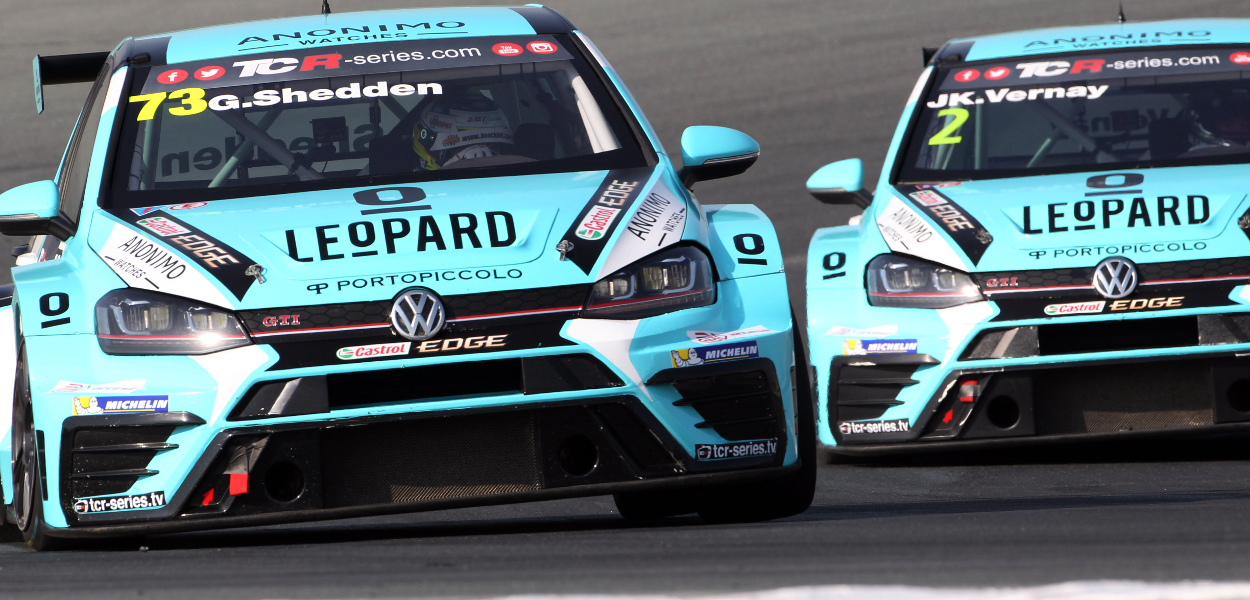“Obviously my programme in the UK is with Honda in the BTCC, they won’t pay me to go and do TCR UK. That’s not where it is as a national championship, in the fairest way. International is a different game and something I’m absolutely interested in.”
It should have been obvious, shouldn’t it? Those were Gordon Shedden’s words to this reporter and TouringCars.net at the Dubai Autodrome back in November, as he scored pole position and a podium finish at the TCR International Series finale.
At the time, it seemed the three-time British Touring Car Champion was there simply ‘for a friend’, deputising for the otherwise-engaged Rob Huff whilst the latter competed in the now-dead World Touring Car Championship at Macau.
Shedden’s task that weekend was simple; help 2010 Indy Lights Champion Jean-Karl Vernay across the line to claim the final (so far) TCR International series title, a feat achieved in the opening contest of the weekend without the Scot having to concede so much as a single place to the Frenchman.
Perhaps there was more to it. Even subconsciously, Shedden will have been taking stock of the category, equipped with a front-running Volkswagen Golf GTi TCR for the weekend under the wing of one of international touring car racing’s best technical setups, inheriting the car from 2012 World Touring Car Champion Rob Huff. He described them at the time as very “user friendly”, but essentially not a huge learning curve in comparison to the NGTC machinery he was accustomed to racing on domestic shores with Honda.
To most people, particularly given the scepticism in some quarters by supporters of the BTCC, that would appear to be a slight, a criticism of the competitive capabilities of the series, and specifically the cars that currently underpin a global revolution of sorts as TCR-branded championships continue to spring up in all four corners of the world, with more seemingly on the way. It is, instead, an opportunity.
Show me a racing driver who says he has no interest in testing himself on the global stage, and I’ll show you a liar. Certainly, some remain in the UK for their own interests – Jason Plato, for example, has said in conversation in the past that his brand, and the loyal following he receives, are chief reasons for continuing to pursue records in the BTCC. Even those up-and-coming, who insist that being BTCC champion would be the pinnacle of every career, are partly-lying. Sure, it can be the end goal, and it’s probably quite a realistic one if you have the financial backing and the talent. But you’d be curious to know how you fared against the best from other shores, surely?
Gordon Shedden has nothing left to prove in the UK. The Scot is near a half-century of wins in the UK’s headline tin-top series, has three championships to his name (two of which were won from unfavourable positions at the mid-season break), has rubbed shoulders with legends past, present and future and emerged on top and has many years in the sport left ahead of him.
Any BTCC team would leap at the opportunity to run Shedden in one of its cars – so why not take a risk? Why not jump on board with a rapidly expanding motorsport and business model and start afresh?
Firstly, there’s the competitive challenge. Sceptic or not, the brand-new FIA World Touring Car Cup – which Belgian media are already reporting Shedden is bound for in a move that will re-unite him with WRT – is going to be brimming with talent. Take a cursory glance at the list of all-time winners in WTCC or TCR and you’re looking at drivers who would be able to step into a BTCC machine and be competitive. It’s a chance for Shedden to prove he can overcome the best of his generation globally.
Then there’s the environment, both technically and from a sporting side. One senior member of staff at a BTCC manufacturer team (and still a successful one at that) recently said to me that they knew the BTCC was “an entertainment championship”, but took part anyway. Though nothing should be taken away from the driving ability of Ash Sutton, many still feel the Subaru Levorg GT was not treated correctly from a balance of performance standpoint in 2017. Even Shedden himself expressed to me, tongue-in-cheek, a wonder about when motorsport stopped being about who was the most competitive in a car engineered to the highest level.
TCR regulation cars might not be the most difficult to master at the moment, but the philosophy is still young, and input from drivers of Shedden’s calibre and experience may be exactly what is needed to not only make the improvements that time and necessity will inevitably call for, but also raise the profile of international touring car racing as a whole. It’s an exciting project to be part of, particularly if you consider the legacy it could leave in the future.
The uninformed would probably swear that the best touring car engineering in the world is done by around ten BTCC teams in the UK, and they’d be wrong. It’s time to start thinking bigger.
The reputation of international touring car racing suffered during the final years of the WTCC with the decline of manufacturer involvement, the loss of some star names and the simultaneous rise of the BTCC under NGTC regulations.
Undoubtedly, the BTCC is still the benchmark – it would be foolish to suggest otherwise. It’s presence, both trackside and online, marks it out as the benchmark to which the WTCR will inevitably be compared, and rightfully so.
Make no mistake though, the sleeping giant is stirring. And then I wonder whether we’ll remember Gordon Shedden for just his BTCC titles, or what came next as well?

